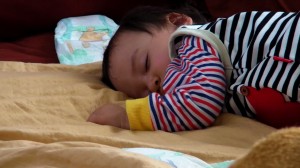 The other night, my wife, Jean, stood at the entrance to our bedroom with an unhappy look on her face—unhappy, but also helpless. From behind the nearly closed door to our daughter Sasha’s room came an unearthly wail, the sound of a 14-month-old baby who absolutely did not want to be in bed.
The other night, my wife, Jean, stood at the entrance to our bedroom with an unhappy look on her face—unhappy, but also helpless. From behind the nearly closed door to our daughter Sasha’s room came an unearthly wail, the sound of a 14-month-old baby who absolutely did not want to be in bed.
Of course, she had already been in bed, and sound asleep, for more than two hours, and was merely waking up as she occasionally does, for a few minutes at a time before dropping off again. Still, that noise! It’s almost impossible to ignore it; it penetrates straight to a parent’s heart; it is at the center of an ongoing debate about sleep-training—a debate that we here at Dadwagon are taking up this week.
Frankly, Jean, Sasha, and I have had it easy. Sasha is a cheerful, acquiescent character, and getting her to go to sleep—and stay asleep—has not proven much of a challenge. We did this in a very structured way:
- • At 7 months, we moved her crib from our bedroom to her own room.
- • We put her to bed at the same time every night, around 7:30, hewing to a set routine: we read her a book, brush her teeth, and tuck her in.
- • We decided only to give her a pacifier when she was going to sleep, both to keep her quiet and, à la Pavlov, to get her to associate the pacifier with slumber.
It all worked very well, and ever since, Sasha has slept 11 hours a night, generally getting up the next morning between 5:45 and 7 a.m. We’ve even weaned her off the pacifier, and she’ll often go down to sleep without a fight or a peep. Lucky us! Lucky Sasha!
And yet… There are still those cries, those moments when the sound of misery rings out in our home, and we feel compelled to rush to her and hold her in our arms and comfort her. But we don’t. (This is easier for me than for Jean.) Instead, we keep watching TV or reading or cooking or whatever, and let Sasha bawl for a few minutes, until eventually she stops.
Is this cruel?
No. Sasha has no memories yet, and though she can say a few words and understand many more, she’s not fully a thinking person.
But at the same time, she IS a person. I recognize that sleep training works for us precisely because it works for Sasha. She is one of the happier and better-adjusted babies I’ve met, and her writhing-on-the-floor moments come rarely and evaporate quickly. Were she a different child, a more nervous one affected longer and more deeply by nightly abandonment, we might have chosen a different tack.
But who knows? Maybe somewhere down the line, this harsh sleep-training will bear sour fruit, and Sasha will turn out to be a thief, a serial killer, or worse. And then we’ll have something to keep us up all night.



 The other night, my wife, Jean, stood at the entrance to our bedroom with an unhappy look on her face—unhappy, but also helpless. From behind the nearly closed door to our daughter Sasha’s room came an unearthly wail, the sound of a 14-month-old baby who absolutely did not want to be in bed.
The other night, my wife, Jean, stood at the entrance to our bedroom with an unhappy look on her face—unhappy, but also helpless. From behind the nearly closed door to our daughter Sasha’s room came an unearthly wail, the sound of a 14-month-old baby who absolutely did not want to be in bed.